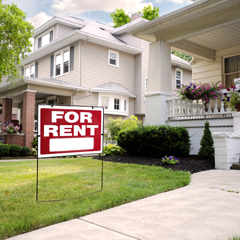Tax Rules that Apply to Home-to-Rental Conversions
February 17, 2020 | Financial Planning, Tax Planning
 A recent report by Apartment Guide found that Maine had the 3rd largest increase in rent in the country last year. With Portland and the surrounding area experiencing a great deal of growth and development, that may not come as a surprise to many.
A recent report by Apartment Guide found that Maine had the 3rd largest increase in rent in the country last year. With Portland and the surrounding area experiencing a great deal of growth and development, that may not come as a surprise to many.
If you own your home and are planning on moving, you may want to consider converting your current residence into a rental property. With demand for rentals high and supply limited, you could make a nice, steady income renting your home.
Converting your home to a rental does come with tax implications, however. Many could work in your favor, but renting out your home isn’t right for everyone. Let’s take a look at a few tax issues to consider.
Calculating the Tax Basis of a Converted Property
One important question arises when you convert your residence into a rental: How to determine the property’s tax basis for depreciation purposes during the rental period and for gain or loss purposes when you eventually sell?
Two different rules apply here:
- For gain on sale purposes. The normal rule for computing the tax basis of a converted property for tax gain purposes is straightforward. The property’s basis usually equals the original purchase price, plus the cost of improvements, minus any depreciation. This includes depreciation claimed from having a deductible home office while you lived there, and after you convert the property into a rental.
- Rules for depreciation and loss on sale purposes. You can’t claim a tax loss when you sell a personal residence for less than tax basis. The privilege of claiming tax losses is reserved for sales of business or investment property.
It’s commonly believed that if you convert a residence into a rental and then sell it for a loss down the road, you can claim a tax loss on the sale. However, this is not true. There is a special — and unfavorable — tax basis rule that usually prevents claiming losses in this situation. It states that the tax basis of a converted personal residence for tax loss purposes equals the lesser of:
- The property’s normal tax basis on the conversion date (as explained above), or
- The property’s fair market value (FMV) on the conversion date.
As stated earlier, the property’s normal tax basis usually equals the original purchase price plus the cost of improvements minus any depreciation claimed over the years. This special basis rule is intended to disallow a loss from a decline in value that occurs before the conversion date. But a further decline in value after the conversion can result in an allowable tax loss when you sell the property. However, basis reductions from post-conversion depreciation deductions can offset any post-conversion decline in value.
You must use the same unfavorable special basis rule to determine your initial tax basis in the converted property for purposes of calculating depreciation deductions during the rental period. You can depreciate the basis allocable to the building — not the portion that’s allocable to the land — over 27.5 years using the straight-line method.
The odds of selling a property for a loss are low, especially in the Portland area. The odds your property value will decline after a conversion to a rental may be even lower. But if the property’s value continues to drop, converting sooner rather than later will produce better tax results for you under the special basis rule.
Evaluating the Tax Results of a Sale
The special basis rule used for tax loss purposes is different from the normal basis rule used for tax gain purposes. Therefore, you can easily wind up selling the converted property for a price that results in neither a tax loss nor a tax gain. This happens if the sale price falls between the basis number used for tax loss purposes, and the basis number used for tax gain purposes.
Important: If you sell a former principal residence within three years after converting it into a rental, the federal home sale gain exclusion break will usually be available. Under that break, you can shelter up to $250,000 of taxable gain ($500,000 if you’re married). However, you can’t shelter gain attributable to depreciation, including depreciation claimed after you convert the property to a rental.
Deferring Taxes with a Section 1031 Exchange
Owners of rental properties can sell appreciated properties and defer the federal income hit indefinitely. This strategy is commonly known as a like-kind exchange under Internal Revenue Code Section 1031.
With a Sec. 1031 exchange, you swap the property you want to unload for another property (the replacement property). You’re allowed to defer paying taxes until you sell the replacement property. Or when you’re ready to unload the replacement property, you can arrange another Sec. 1031 exchange and continue deferring taxes.
Need Help?
Converting a personal residence into a rental property triggers some complicated tax rules. If it’s a move you’re considering, contact Filler & Associates and we can help you understand and plan for any tax implications.
